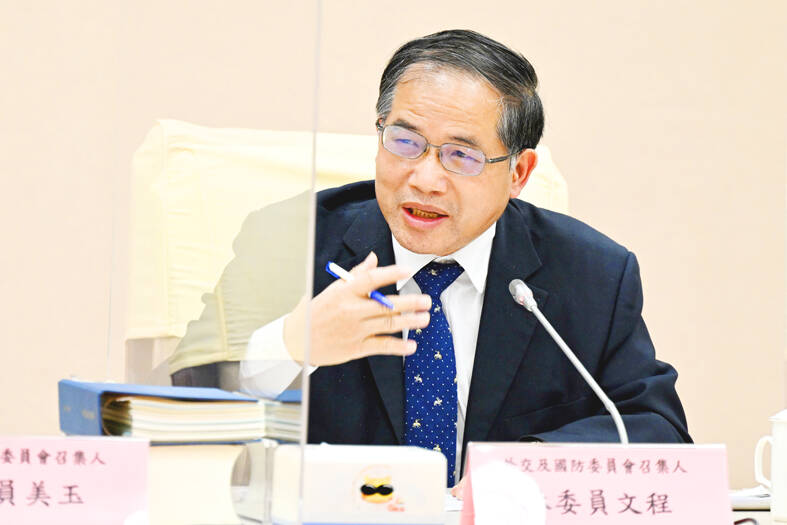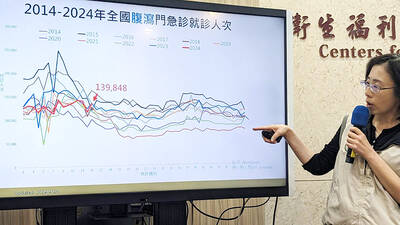Control Yuan member Lin Wen-cheng (林文程) on Friday presented a briefing on his assessment of alleged corruption in procurement programs by the Ministry of National Defense (MND), and put forth recommendations for corrective measures.
Following an inspection tour of the Executive Yuan by Control Yuan members, Lin said that Taiwan is facing a hostile military threat, and President Tsai Ing-wen (蔡英文) has granted full support to the armed forces for weapons procurement, upgrading defense capabilities and expanding troop training for preparedness.
“Aware of a potential military conflict, Taiwanese are willing to bear the burden of challenging times, and have given support to boosting the national defense budget, while expecting every dollar to be used effectively,” said Lin, who is convener of Control Yuan’s Committee on Foreign and National Defense Affairs.

Photo: George Tsorng, Taipei Times
Lin said the MND’s tendered contracts and budgets have increased in the past few years, creating opportunities for “graft in military procurement,” and “oversight and monitoring” is “difficult.”
In 41 investigations by the Control Yuan over the past few years relating to MND and armed forces units, Lin said 14 were regarding corruption in procurement, while 17 related to the administration of training programs.
Seven of the procurement probes resulted in impeachment, censure and other corrective measures, but were not made public given their security classifications.
Lin summarized findings in five primary areas, which he tabled to the MND and the Executive Yuan for assessment and the administration of corrective measures.
Internal oversight mechanisms should be enhanced, Lin said, adding that the ministry created ethics offices and engaged inspectors to monitor and combat corruption.
“Most cases involved misconduct and contraventions of the Government Procurement Act (政府採購法), but were not caught in time by inspectors and supervisors,” Lin said.
“The breaches were later reported by government’s Audit Office for judicial investigation,” he added.
“The MND should enhance its internal control and oversight mechanism to catch misconduct and corruption when it happens,” he said.
The government should also provide special research funds for the MND, as commissioning weapons research on supersonic missiles, for instance, resulted in “contractors buying low-cost China-made parts of inferior quality,” leading to “defects and poor missile performance,” Lin said.
Taiwan’s top weapons research center, the Chungshan Institute of Science and Technology (NCSIST), should be restructured as well, as Lin.
Having top MND officials serving on the institute’s governing board while being responsible for performance appraisal leads to questions regarding their impartiality, he said.
“MND inspectors seldom checked procurement and production projects, which are based on specifications and requirements set by the Chungshan Institute itself. This is an impediment to quality and capacity for weapons production, and interferes in the institute’s internal audits and oversight of possible risks and violations in procurement,” Lin said.
The MND must have strict monitoring and auditing of procurement, he said.
“Portions of MND procurement tenders have unusual links to certain contracting firms... Deficiencies have been found in the bid tender process, along with evaluation of bids and contractor qualifications,” Lin said.
“In the Control Yuan’s review on corruption and legal violations found in investigations, about one-third, or 14 out of 41 cases, are related to procurement programs, showing a lack of oversight and a lack of rigorous compliance. MND personnel need guidance in abiding by the law,” he said.
More must be done to prevent corruption among officials and contractors, he said.
“The MND procurement units are monopolized by a few contractors that have met requirements and conditions for approval. There are reasons to believe that graft, bribery and corruption in military procurement will continue to take place, and oversight agencies must be aware of this,” Lin said.
“The MND must make it best effort to prevent outside forces from influencing military procurement. It should also take steps to enhance staffing of appropriately experienced personnel,” he said.
Premier Su Tseng-chang (蘇貞昌) acknowledged Lin’s report.
“It is quite a thorough briefing, and we thank the Control Yuan for pointing out these problems,” Su said.
“National defense is within the president’s authority, and the ministry should respond to the president regarding the Control Yuan’s findings and suggestions,” he said.

FLU SEASON: Twenty-six severe cases were reported from Tuesday last week to Monday, including a seven-year-old girl diagnosed with influenza-associated encephalopathy Nearly 140,000 people sought medical assistance for diarrhea last week, the Centers for Disease Control (CDC) said on Tuesday. From April 7 to Saturday last week, 139,848 people sought medical help for diarrhea-related illness, a 15.7 percent increase from last week’s 120,868 reports, CDC Epidemic Intelligence Center Deputy Director Lee Chia-lin (李佳琳) said. The number of people who reported diarrhea-related illness last week was the fourth highest in the same time period over the past decade, Lee said. Over the past four weeks, 203 mass illness cases had been reported, nearly four times higher than the 54 cases documented in the same period

A group of Taiwanese-American and Tibetan-American students at Harvard University on Saturday disrupted Chinese Ambassador to the US Xie Feng’s (謝鋒) speech at the school, accusing him of being responsible for numerous human rights violations. Four students — two Taiwanese Americans and two from Tibet — held up banners inside a conference hall where Xie was delivering a speech at the opening ceremony of the Harvard Kennedy School China Conference 2024. In a video clip provided by the Coalition of Students Resisting the CCP (Chinese Communist Party), Taiwanese-American Cosette Wu (吳亭樺) and Tibetan-American Tsering Yangchen are seen holding banners that together read:

UNAWARE: Many people sit for long hours every day and eat unhealthy foods, putting them at greater risk of developing one of the ‘three highs,’ an expert said More than 30 percent of adults aged 40 or older who underwent a government-funded health exam were unaware they had at least one of the “three highs” — high blood pressure, high blood lipids or high blood sugar, the Health Promotion Administration (HPA) said yesterday. Among adults aged 40 or older who said they did not have any of the “three highs” before taking the health exam, more than 30 percent were found to have at least one of them, Adult Preventive Health Examination Service data from 2022 showed. People with long-term medical conditions such as hypertension or diabetes usually do not

Heat advisories were in effect for nine administrative regions yesterday afternoon as warm southwesterly winds pushed temperatures above 38°C in parts of southern Taiwan, the Central Weather Administration (CWA) said. As of 3:30pm yesterday, Tainan’s Yujing District (玉井) had recorded the day’s highest temperature of 39.7°C, though the measurement will not be included in Taiwan’s official heat records since Yujing is an automatic rather than manually operated weather station, the CWA said. Highs recorded in other areas were 38.7°C in Kaohsiung’s Neimen District (內門), 38.2°C in Chiayi City and 38.1°C in Pingtung’s Sandimen Township (三地門), CWA data showed. The spell of scorching